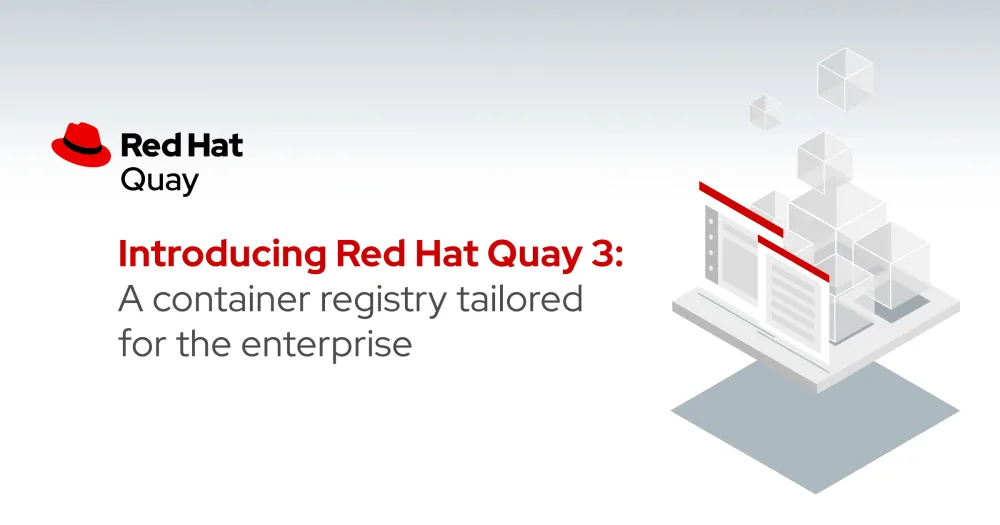
Today we announce Red Hat Quay 3, a security-focused, scalable and automated container image registry.
Built for storing container images, Quay offers visibility over images themselves. It can be integrated into your CI/CD pipelines and existing workflows using its API and other automation features. This release brings support for multiple architectures, Windows containers, and a Red Hat Enterprise Linux-based image to help users store, build, and deploy their images in a more secure way across diverse enterprise environments.
Quay was first released in 2013, as the first enterprise hosted registry. We celebrate the first major release of the container registry since it joined the Red Hat portfolio of products through the acquisition of CoreOS.
Quay: Enterprise Container Registry
Red Hat Quay is a container registry tailored for the enterprise. It can accelerate time to deployment with automated build and lifecycle management features. Quay can scale according to business needs with geographic replication and higher availability.
With Quay 3 we introduce support for:
-
Multiple Architectures: Support for multiple architecture manifests. Customers can run containers on more platforms and use different systems such as IBM Power LE and Z System workloads, ARM-based IoT devices, and Windows-based workloads.
-
Windows container images: Quay now supports storing Windows container images. Users with Windows-based workloads can now use Quay.
-
RHEL-based: Uses Red Hat Enterprise Linux base images for the Quay container. Building Quay on a RHEL base image can bring more reliability, security, performance, and consistent operational model.
Security scanning in Red Hat Quay
Quay has security features including its support for multiple authentication systems and identity providers. It offers vulnerability scanning via integration with the Clair security scanner. It also offers encrypted CLI passwords, detailed logging of events for auditing, and helps teams and organizations in mapping for advanced access control management.
Beyond the existing security features, users can experience expanded security features in this release thanks to a RHEL base image. This helps to deliver a fully supported container deployment pipeline with components optimized for containers and a smaller potential attack surface.
Red Hat Quay and Red Hat OpenShift
Users of Red Hat OpenShift must select an image registry to pair with their platform. Red Hat Quay is well-suited for these customers because of its security and automation features for enterprises. It remains a goal going forward to build tighter integration between the two products, helping to provide an increasingly better experience for users of both products. By including a configuration UI in this release, we are making strides toward our goal to help make Quay easier to run on Kubernetes and other deployments. It can automatically deploy changes to nodes and can trigger Kubernetes blue-green deployments of Quay containers for configuration updates. This can help make running Quay on OpenShift easier because you can deploy changes to the configuration of Quay itself more easily than in previous versions.
Future of Red Hat Quay
In future development of Quay we plan to focus on improving the overall user and day two experience.
Some examples of what is planned include automating mirroring of namespaces, repositories, or a subset of those between multiple registries. Enhanced support for storage backends and other content types, as well as content governance related enhancements are also planned.
We are proud that Quay has been able to address the container registry needs of customers across multiple sectors and a variety of sizes and look forward to working together to continue improving the product.
Get started with Red Hat Quay
Further information about the release can be found inside the Red Hat Quay v3 release notes and the Quay upgrade documentation. To try Red Hat Quay free, visit redhat.com.
Sobre o autor
Mais como este
Ford's keyless strategy for managing 200+ Red Hat OpenShift clusters
F5 BIG-IP Virtual Edition is now validated for Red Hat OpenShift Virtualization
Can Kubernetes Help People Find Love? | Compiler
Scaling For Complexity With Container Adoption | Code Comments
Navegue por canal
Automação
Últimas novidades em automação de TI para empresas de tecnologia, equipes e ambientes
Inteligência artificial
Descubra as atualizações nas plataformas que proporcionam aos clientes executar suas cargas de trabalho de IA em qualquer ambiente
Nuvem híbrida aberta
Veja como construímos um futuro mais flexível com a nuvem híbrida
Segurança
Veja as últimas novidades sobre como reduzimos riscos em ambientes e tecnologias
Edge computing
Saiba quais são as atualizações nas plataformas que simplificam as operações na borda
Infraestrutura
Saiba o que há de mais recente na plataforma Linux empresarial líder mundial
Aplicações
Conheça nossas soluções desenvolvidas para ajudar você a superar os desafios mais complexos de aplicações
Virtualização
O futuro da virtualização empresarial para suas cargas de trabalho on-premise ou na nuvem
